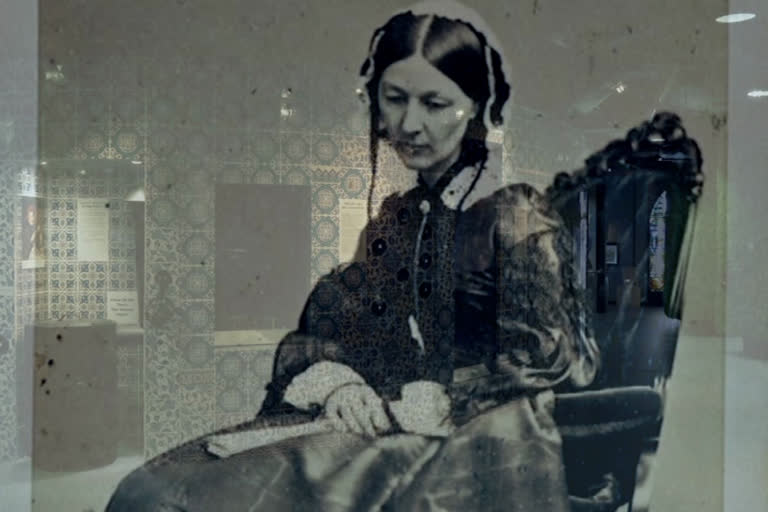London: Florence Nightingale, the woman credited as the world's first nurse, marks her 200th birth anniversary on Tuesday (12th May 2020).
She was responsible for improving hygiene to control the spread of infections, but her bicentenary comes amid the biggest global healthcare crisis in generations.
Before her, modern nursing did not exist.
But her work treating the British military during the Crimean War in what is now Istanbul changed all that.
At the Florence Nightingale Museum in London, the famous lamp that she carried as she tended to injured soldiers takes pride of place.
Watch | Watch: Penguins take a hike in woods while zoo is closed
David Green, the museum's director, says her message is as important than ever: "Nightingale's certainly very relevant today because of the pioneering work that she did regarding hygiene, particularly the washing of hands, making sure that there is good evidence regarding how you nurse and following through good practice with everyone, holding them to account and having high benchmarks."
"Her cleanliness did start when she was in the Crimean War and she was at Scutari Hospital. When she arrived it was a disgrace. Ultimately, it wasn't fit to be a hospital. There was sewage on the floor. There was even a dead horse in the well."
Nightingale travelled to Crimea with her medicine chest.
Watch | Watch: NY nurse details challenges working in ICU
It contained basic treatments such as quinine to treat malaria and carbonate of potassium for fever.
But it was her push to improve hygiene at the hospital that made an impact. More soldiers were dying from infections from battlefield wounds.
Once Nightingale and her team had cleaned up the facility, cases of typhoid, cholera and dysentery and other infections dropped.
Nightingale brought what she had learned in a few short years at Scutari to campaign for better healthcare back home in Britain.
A talented statistician, she used hard facts and figures to lobby for improvements to both military medical care and that of ordinary people.
She wrote around 13,000 letters as part of her campaigning and her status after the Crimean War meant people in power took notice.
"She was the hero the nation needed during the Crimean War at the times when things went very, very badly for the UK. There wasn't a military hero. There wasn't a political hero from that conflict. And so there was a gap there. And Nightingale as a nurse was able to fill that," explains Green.
"It gave her the platform to be able to speak, to speak with authority and passion about how healthcare should be better."
Nightingale secured funds to reform nursing in hospitals by introducing new training that was based on sound scientific principles.
The job has changed hugely over the centuries, with 21st-century nurses now highly skilled and carrying out medical procedures that Nightingale and her generation of nurses could never have imagined.
Hygiene and sanitation are in the public eye once again as the world grapples with the virus pandemic.
Nightingale's work on preventing the spread of infection is more relevant than ever.
"The principles remain as just the same today as they did 200 years ago, which is you need to wash your hands and you need to make sure that the environment you work in is incredibly clean and tidy and importantly the space between patients and the need for ventilation within those clinical areas matters," says Eileen Sills, Chief Nurse at Guys and St Thomas' NHS Foundation Trust.
"We're now applying those principles in clearly very different buildings, in a very different era. But it's no different than it was 200 years ago."
Nightingale and her nurses worked amid a war.
Today's war is against an invisible enemy - COVID-19.
Working conditions and government restrictions imposed to help fight the virus make this modern-day crisis just as stressful to deal with as any battlefield.
"What COVID-19 has done is normally when you leave work, you go home and you can leave your job behind," explains Sills.
"But I think that that people are having to take, the work goes home with them because they're seeing it in the media all the time. Their families are anxious, their life outside of work is not normal either. And so it's not as though you can go to work and it's difficult and come home and have a relaxing, enjoyable break at home because work, because home is also very different."
Nightingale has left her mark on the world.
In the UK, temporary hospitals set up to treat virus patients who have been named after her.
In Turkey, where she got her first taste of nursing, numerous permanent hospitals bear her name.
Nightingale's work is all the more extraordinary, considering the time she was living in.
"If we then put that back to a time where women didn't have the same status in society that they have today, what an amazing woman doing and achieving such amazing things that actually if she was alive today, it's amazing to think what contribution she would be making now," says Sills.
As the UK remains in lockdown, the museum created to educate the public about her work is closed.
A special exhibition which includes a recreation of her final bedroom, complete with a gramophone playing her voice has been set up especially for the bicentenary. Parts of the exhibition can be viewed on the museum website.
The museum relies on visitors for 98 percent of its income, so without alternative funding, it now faces the very real possibility of permanent closure. On its website, it is asking the public for donations to keep it going.
The coronavirus could yet silence a place where this remarkable woman is celebrated.
(AP)



